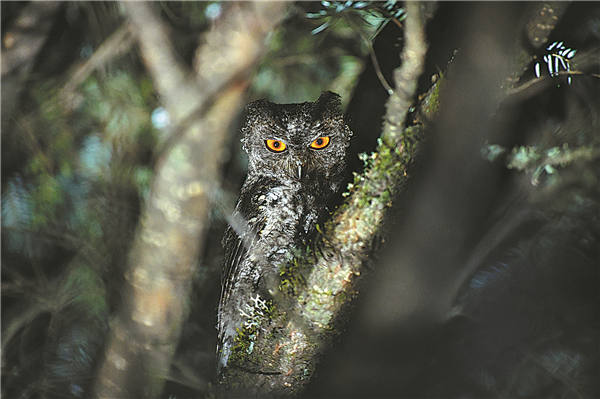Taking our understanding of the elusive Sclater's monal to new heights


"Gaoligong is the highest barrier that the warm and humid air mass from the tropical Indian Ocean first encounters, so that it rains a lot," he says.
Heavy rainfall and high humidity lay the foundation for area's rich biodiversity. Big variations in altitude (five in total) and elevation endow Gaoligong with seven types of climatic regions, ranging from subtropical to frigid zones.
The advantage of the weather is further strengthened by the location. The Gaoligong Mountains, located in the transitional zone of two zoogeographic regions, provide a corridor for species to communicate and migrate.
So far, scientists have found 6,711 vascular plants, including the endangered Taiwania flousiana Gaussen and big tree rhododendrons, and more than 2,600 animals. What's more, since 1980, over 620 new species have been found, such as Nujiang golden monkey and Gaoligong hoolock gibbon.
During their trip in 2015, Wang, Gao and their guide stayed on the mountain for 45 consecutive days, but only saw clear sky on one of them. There was not much space in the tents, so snow or rain fell into the cookers they kept outside, Wang recalls, laughing.
What made them stay was the exciting discovery of a nest of Sclater's monal, the first since the previous discovery 12 years ago. Sclater's monal, nicknamed the "snow goose", has two subspecies and one lives only inside the forests of the Gaoligong National Nature Reserve at an altitude from 2,500 to 4,000 meters.
It is a highly vigilant bird. The first time when Wang tried to take a photograph of one, it was pecking on the ground. Hearing the sound of the camera's shutter, it flew away. Gradually, however, these birds became familiar with the two researchers, who showed up every day when the dawn had just broken, and the female birds were singing their first song.
During the 45 days, they found two nests, each containing three eggs. Wang recorded the whole process of incubation, hatching and the bird leaving the nest. It was the first time anyone had documented the full birthing process of these birds.
"Most birds hatch without a feather, but the Sclater's monal already has feathers when it emerges from the shell and can leave the nest after just two days, which is unique," he says.
Every year between 2015 and last year, Wang visited the observation point and used his cameras to record the life of these endangered birds. During his 2016 visit, he saw 16 of them, the largest congregation recorded to date.




































